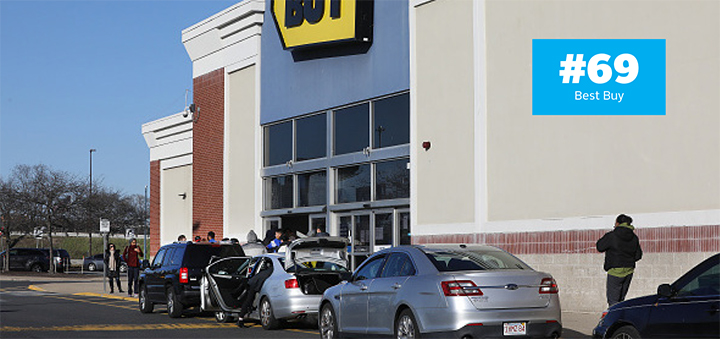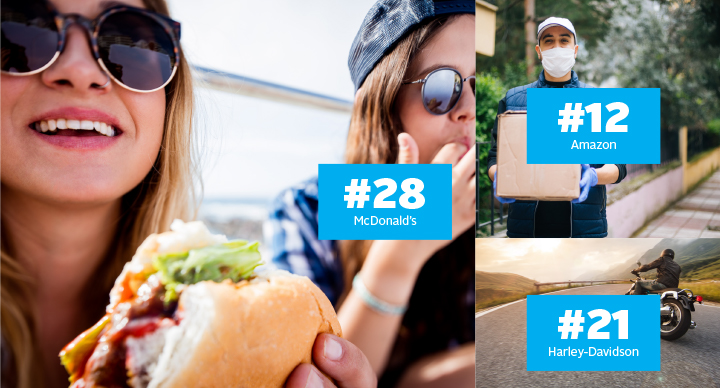Top 100 Most Powerful Brands of 2020
Each year, Tenet Partners analyzes the data in the CoreBrand® Index (CBI) to determine the Top 100 Most Powerful Brands based on high awareness and positive brand perceptions. The full annual report we released earlier this year reflected the Top 100 BrandPower rankings based on data obtained through the end of 2019.
The events of 2020 have upended life as we know it and as a result, drastically changed the way brands are perceived. Because of this, we’ve updated the Top 100 BrandPower rankings to take into account additional data from Q1 and Q2 of 2020. These reflect the ongoing impact of the pandemic, adding current context to the comprehensive analysis that can be seen by downloading the full report.
| Company | Rank Change | Q2 2020 BrandPower Rank | 2019 BrandPower Rank | Industry |
|---|---|---|---|---|
| Apple Inc. | 1 | 1 | 2 | Information Technology |
| Coca-Cola Company | -1 | 2 | 1 | Consumer Staples |
| The Walt Disney Company | 3 | 3 | Communication Services | |
| PepsiCo Inc. | 4 | 4 | Consumer Staples | |
| Google-Alphabet | 1 | 5 | 6 | Communication Services |
| Microsoft Corp. | -1 | 6 | 5 | Information Technology |
| American Express Co | 2 | 7 | 9 | Financials |
| Amazon.com Inc. | 4 | 8 | 12 | Consumer Discretionary |
| International Business Machines | 1 | 9 | 10 | Information Technology |
| Johnson & Johnson | -3 | 10 | 7 | Health Care |
| Facebook, Inc. | 11 | 11 | Communication Services | |
| Visa Inc. | 1 | 12 | 13 | Information Technology |
| Mastercard Inc. | 1 | 13 | 14 | Information Technology |
| The Hershey Company | -6 | 14 | 8 | Consumer Staples |
| Campbell Soup | 2 | 15 | 17 | Consumer Staples |
| General Mills | -1 | 16 | 15 | Consumer Staples |
| eBay Inc. | 3 | 17 | 20 | Consumer Discretionary |
| Kellogg Co. | -2 | 18 | 16 | Consumer Staples |
| Twitter, Inc. | 19 | 19 | Communication Services | |
| Colgate-Palmolive | -2 | 20 | 18 | Consumer Staples |
| Morgan Stanley | 1 | 21 | 22 | Financials |
| Bank of America Corp | 2 | 22 | 24 | Financials |
| Bristol-Myers Squibb | 4 | 23 | 27 | Health Care |
| Harley-Davidson | -3 | 24 | 21 | Consumer Discretionary |
| Hilton Worldwide Holdings Inc | 25 | 25 | Consumer Discretionary | |
| Exxon Mobil Corp. | -3 | 26 | 23 | Energy |
| Nike | -1 | 27 | 26 | Consumer Discretionary |
| McDonald’s Corp. | 28 | 28 | Consumer Discretionary | |
| General Electric | 29 | 29 | Industrials | |
| Pfizer Inc. | 7 | 30 | 37 | Health Care |
| The Clorox Company | -1 | 31 | 30 | Consumer Staples |
| AT&T Inc. | 32 | 32 | Communication Services | |
| Whirlpool Corp. | -2 | 33 | 31 | Consumer Discretionary |
| Starbucks Corp. | -1 | 34 | 33 | Consumer Discretionary |
| Ford Motor | 35 | 35 | Consumer Discretionary | |
| JPMorgan Chase & Co. | 6 | 36 | 42 | Financials |
| Estee Lauder Cos. | -3 | 37 | 34 | Consumer Staples |
| Procter & Gamble | -2 | 38 | 36 | Consumer Staples |
| Mattel Inc. | -1 | 39 | 38 | Consumer Discretionary |
| Capital One Financial | -1 | 40 | 39 | Financials |
| JM Smucker | -1 | 41 | 40 | Consumer Staples |
| CBS Corp. | 2 | 42 | 44 | Communication Services |
| General Motors | 2 | 43 | 45 | Consumer Discretionary |
| Intel Corp. | 4 | 44 | 48 | Information Technology |
| Hewlett Packard Enterprise | -4 | 45 | 41 | Information Technology |
| American Airlines Group | 4 | 46 | 50 | Industrials |
| DuPont de Nemours Inc | -4 | 47 | 43 | Materials |
| Netflix Inc. | 1 | 48 | 49 | Communication Services |
| Charles Schwab Corporation | 6 | 49 | 55 | Financials |
| FedEx Corporation | -4 | 50 | 46 | Industrials |
| Marriott Int’l. | 5 | 51 | 56 | Consumer Discretionary |
| Target Corp. | 52 | 52 | Consumer Discretionary | |
| Chevron Corp. | -6 | 53 | 47 | Energy |
| Kraft Heinz Co | -3 | 54 | 51 | Consumer Staples |
| Walmart | -1 | 55 | 54 | Consumer Staples |
| United Parcel Service | -3 | 56 | 53 | Industrials |
| Gap Inc. | 57 | 57 | Consumer Discretionary | |
| Verizon Communications | 3 | 58 | 61 | Communication Services |
| Ralph Lauren Corporation | 59 | 59 | Consumer Discretionary | |
| Royal Caribbean Cruises Ltd | -2 | 60 | 58 | Consumer Discretionary |
| Home Depot | -1 | 61 | 60 | Consumer Discretionary |
| Lowe’s Cos. | 1 | 62 | 63 | Consumer Discretionary |
| Sherwin-Williams | 3 | 63 | 66 | Materials |
| Delta Air Lines Inc. | 6 | 64 | 70 | Industrials |
| Best Buy Co. Inc. | 4 | 65 | 69 | Consumer Discretionary |
| Hanesbrands Inc | 2 | 66 | 68 | Consumer Discretionary |
| Macy’s Inc. | 67 | 67 | Consumer Discretionary | |
| Tiffany & Co. | 3 | 68 | 71 | Consumer Discretionary |
| Stanley Black & Decker | 3 | 69 | 72 | Industrials |
| HP Inc. | -8 | 70 | 62 | Information Technology |
| Kohl’s Corp. | 2 | 71 | 73 | Consumer Discretionary |
| Western Union Co | 3 | 72 | 75 | Information Technology |
| Tyson Foods | 1 | 73 | 74 | Consumer Staples |
| Boeing Company | -10 | 74 | 64 | Industrials |
| Walgreens Boots Alliance | -10 | 75 | 65 | Consumer Staples |
| CVS Health | 3 | 76 | 79 | Health Care |
| Costco Wholesale Corp. | -1 | 77 | 76 | Consumer Staples |
| Foot Locker Inc | 78 | 78 | Consumer Discretionary | |
| Allstate Corp | 1 | 79 | 80 | Financials |
| Xerox | 2 | 80 | 82 | Information Technology |
| United Technologies | 7 | 81 | 88 | Industrials |
| Carnival Corp. | 2 | 82 | 84 | Consumer Discretionary |
| McCormick & Co. | -2 | 83 | 81 | Consumer Staples |
| Lockheed Martin Corp. | 1 | 84 | 85 | Industrials |
| Dollar General | -2 | 85 | 83 | Consumer Discretionary |
| Citigroup Inc. | 6 | 86 | 92 | Financials |
| Wells Fargo | -10 | 87 | 77 | Financials |
| Southwest Airlines | -2 | 88 | 86 | Industrials |
| Chipotle Mexican Grill | -2 | 89 | 87 | Consumer Discretionary |
| Goldman Sachs Group | 5 | 90 | 95 | Financials |
| Comcast Corp. | 91 | 91 | Communication Services | |
| Molson Coors Brewing Company | -2 | 92 | 90 | Consumer Staples |
| Dish Network | 1 | 93 | 94 | Communication Services |
| Dollar Tree | -5 | 94 | 89 | Consumer Discretionary |
| Dow Inc. | 11 | 95 | 106 | Materials |
| PayPal | 1 | 96 | 97 | Information Technology |
| General Dynamics | 5 | 97 | 102 | Industrials |
| Ulta Beauty | -5 | 98 | 93 | Consumer Discretionary |
| Fox Corporation | 4 | 99 | 103 | Communication Services |
| MetLife Inc. | -1 | 100 | 99 | Financials |





